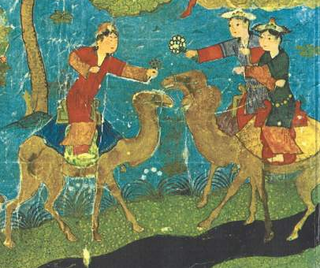
In Islam, God is believed to have 99 names in the Qur'an, known as the 99 Names of God. In some hadiths of Shia and Sunni, it is said that Mahdi reveals the 100th name.

In Islamic religious belief, houris are women who will accompany faithful Muslim believers in Paradise. Muslim scholars differ as to whether they refer to the believing women of this world or a separate creation, with the majority opting for the latter.
Liberalism and progressivism within Islam involve professed Muslims who have created a considerable body of liberal thought about Islamic understanding and practice. Their work is sometimes characterized as "progressive Islam". Some scholars, such as Omid Safi, differentiate between "Progressive Muslims" and "Liberal advocates of Islam".

Tafsir refers to exegesis, usually of the Quran. An author of a tafsir is a mufassir. A Quranic tafsir attempts to provide elucidation, explanation, interpretation, context or commentary for clear understanding and conviction of God's will.

Ahmadiyya Islam considers Jesus as a human mortal man and a prophet of God, born to the virgin Mary. Jesus is understood to have survived the crucifixion based on the account of the Gospels, the Quran, and the hadith. Having delivered his message to the Israelites in Judea, Jesus is understood to have emigrated eastward to escape persecution from Judea and to have further spread his message to the Lost Tribes of Israel. In Ahmadiyya Islam, Jesus is thought to have died a natural death in India. Jesus lived to old age and later died in Srinagar, Kashmir, and his tomb is presently located at the Roza Bal shrine.

The Pen is the sixty-eighth chapter (sūrah) of the Qur'an with 52 verses (āyāt). Quran 68 describes God's justice and the judgment day. Three notable themes of this Surah are its response to the opponents' objections, warning and admonition to the disbelievers, and exhortation of patience to the Islamic prophet Muhammad. Chronologically, this was the first appearance of any of the "disjointed" [i.e., single] letters (muqattaat) which precede a number of the surahs of the Qur'an, while in Quranic order this is the last surah to have the appearance of muqattaat.

The Elephant is the 105th chapter (surah) of the Quran. It is a Meccan sura consisting of 5 verses. The surah is written in the interrogative form.

At-Taḥrīm is the 66th Surah or chapter of the Quran and contains 12 verses (ayah). This Surah deals with questions regarding Muhammad's wives.

Al-Mulk is the 67th chapter (surah) of the Quran, comprising 30 verses. The surah emphasizes that no individual can impose his will on another; he may only guide and set an example (67:26).

al-Muṭaffifīn is the eighty-third surah of the Qur'an with 36 ayat.
Mafatih al-Ghayb, usually known as al-Tafsir al-Kabir, is a classical Islamic tafsir book, written by the twelfth-century Persian Islamic theologian and philosopher, Fakhruddin Razi (d.1210). The book is an exegesis and commentary on the Qur'an. At 32 volumes, it is even larger than the 28-volume Tafsir al-Tabari. It is not unusual for modern works to use it as a reference.
One of [his] major concerns was the self-sufficiency of the intellect. [...] [He] believed [that] proofs based on tradition (hadith) could never lead to certainty (yaqin) but only to presumption (zann), a key distinction in Islamic thought. [...] [However] his acknowledgement of the primacy of the Qur'an grew with his years. [...] [Al-Razi's rationalism] undoubtedly holds an important place in the debate in the Islamic tradition on the harmonization of reason and revelation. In his later years, he also showed interest in mysticism, although this never formed a significant part of his thought.

Tafseer-e-Kabeer is a 10 volume Urdu exegesis of the Quran written by Mirza Bashir-ud-Din Mahmud Ahmad, the second Caliph of the Ahmadiyya Muslim Community, written over a period of 20 years. It is often seen as his masterpiece by some scholars.

Aslam Jairajpuri(Urdu:علامہ اسلم جیراجپوری) was a scholar of Qur'an, Hadith, and Islamic history who is best known for his books Talimat-e-Qur'an and "History of Qur'an. He was Distinguished Professor of Arabic and Persian at Aligarh Muslim University and Jamia Millia Islamia. He was born on 27 January 1882 in Jairajpur, Azamgarh, in Uttar Pradesh, India, and died on 28 December 1955 in Delhi.

Criticism of hadith is the critique of hadith—the genre of canonized Islamic literature made up of reports of the words, actions, and the silent approval of the Islamic prophet Muhammad.

Tolu-e-Islam is a historical, political, religious, cultural magazine of Muslims of British India and Pakistan. In 1935, according to the instructions of Sir Muhammad Iqbal, Syed Nazeer Niazi initiated and edited a journal named after "Tulu'i Islam", a poem by Iqbal. Niazi also dedicated the first edition of this journal to him. For a long time Iqbal had wanted a journal to propagate his ideas and the aims and objective of the All-India Muslim League.

Haqā'iq al-Furqān is a 4 volume exegesis of the Quran compiled from the discouces and sermons of al-Hājj Mawlānā Hāfiz Hakīm Noor-ud-Din, the first Caliph of the Ahmadiyya Muslim Community. It is in Urdu. He was known for his lectures that he would give on tafsir, and studied the classical Islamic sciences. He was also a hafiz, as well as being well-versed in Hebrew and Arabic, especially classical Arabic.

Non-denominational Muslims are Muslims who do not belong to, do not self-identify with, or cannot be readily classified under one of the identifiable Islamic schools and branches.

Quranism or Quraniyya is a protestant branch of Islam. It holds the belief that Islamic guidance and law should only be based on the Quran, thus opposing the religious authority and authenticity of the hadith literature. Quranists believe that God's message is already clear and complete in the Quran and it can therefore be fully understood without referencing outside texts. Quranists claim that the vast majority of hadith literature are forged lies and believe that the Quran itself criticizes the hadith both in the technical sense and the general sense.

Ghulam Ahmed Perwez's ideas focused on systematically interpreting Quranic themes, and Muhammad Iqbal’s writings in the light of Islamic Reform with an aim to reorganize society on a Quranic basis. According to Parwez, the original purpose of Islam, is to free humanity from the oppressive rule of man-made systems of control. These man-made systems include Theocracy and Secular Democracy, both of which, are in contradiction to Quranic principles. A Quranic model of government will give the final authority to God Himself. Such a government allows only those laws which are within the bounds of Quran, and actively promotes Quranic principles. He elaborated on the definition of many Quranic principles, such as that of Zakat, which he defined as universal welfare. He also emphasized the importance of unity for Muslims: "the Qur’an is naturally opposed to sectarianism in deen and factionalism in politics. Sects and factions breed strife and dissension in the Ummah. According to the Qur'an, sectarianism is a form of shirk."












